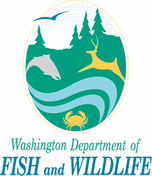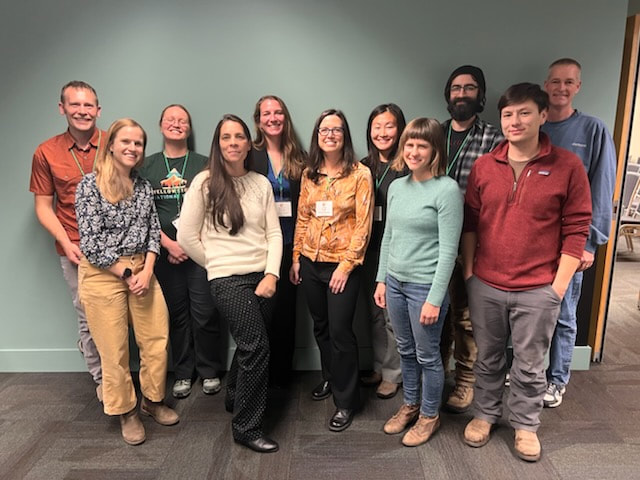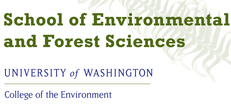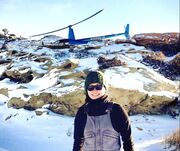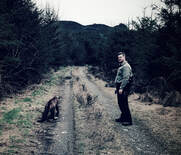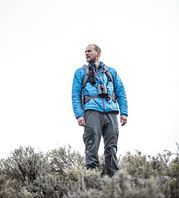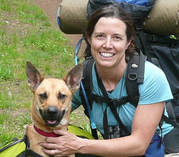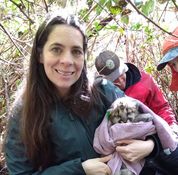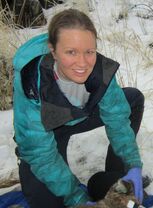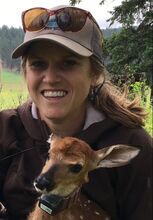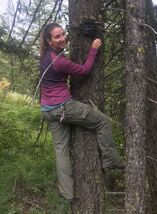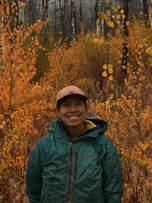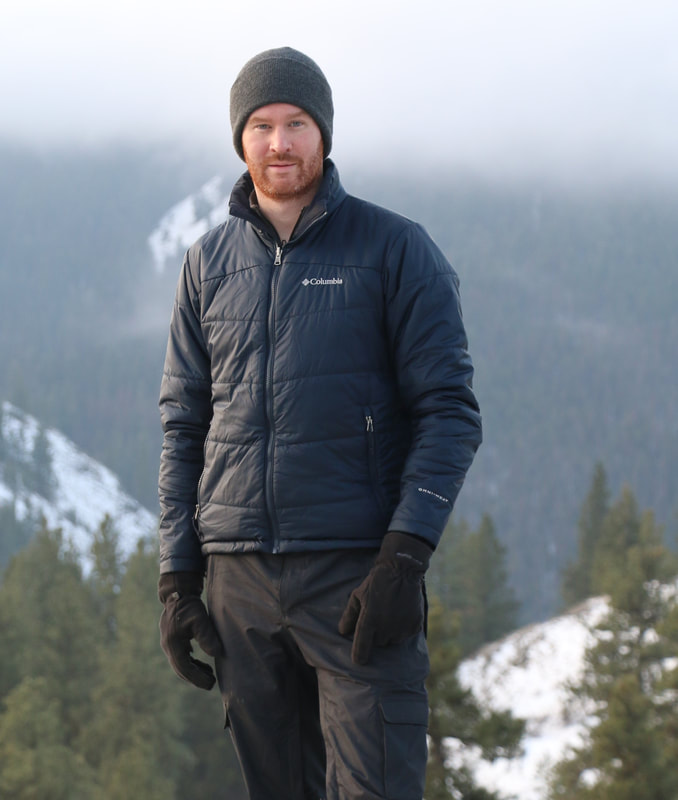Contact us: [email protected] or [email protected]
Washington Department of Fish and Wildlife
|
Melia DeVivo, Ph.D., is an Ungulate Research Scientist for the Washington Department of Fish and Wildlife working on research projects that are relevant to the management and conservation of Washington’s wild ungulates. Her research interests include deer and elk population dynamics, space-use and movement behavior, disease ecology and epidemiology, specifically the impacts of chronic wasting disease on free-ranging deer populations.
|
|
Brian Kertson, Ph.D., is a Wildlife Research Scientist for the Washington Department of Fish and Wildlife conducting long-term, field-intensive research on Washington’s terrestrial, mammalian carnivores. His research incorporates various aspects of behavioral, spatial, and population ecology to address questions of carnivore conservation and management with a particular emphasis on the direct and indirect impacts of carnivores in ecosystems and factors that contribute to carnivore-human interactions.
|
Faculty - University of Washington, School of Environmental and Forest Sciences
|
Aaron Wirsing, Ph.D., is a wildlife ecologist who studies the ways that large carnivores can change the lives of their prey beyond simply killing and eating them. Working along with his students in the Predator Ecology Lab in both terrestrial and aquatic systems, he examines the ways that top predators, such as grey wolves and tiger sharks, can shape their ecosystems through their presence alone, primarily by frightening prey into safety-conscious behavior. His suite of projects shows the benefits of what he calls an “ecology without borders” approach. By comparing the mechanisms that drive predator effects in both aquatic and terrestrial environments, he aims to show underlying similarities between two seemingly disparate systems.
Beth Gardner, Ph.D., is an Associate Professor in the School of Environmental and Forest Sciences and leads the Quantitative Ecology Lab at the University of Washington. Beth's research interests include development of statistical models to assess populations and distributions for fish, wildlife, and other organisms. The research of the lab includes carrying out field studies, integrating data sources, and addressing broad ecological questions to help inform management and conservation of species.
|
Students - University of Washington, School of Environmental and Forest Sciences
|
Lauren Satterfield is a Ph.D. candidate in the Wirsing Predator Ecology Lab at the University of Washington. She is investigating wolf-cougar interactions across anthropogenic landscapes in the Pacific Northwest. She received a B.A. in Mathematics from Mount Holyoke College and a M.S. studying wildlife ecology from the University of Georgia. Her master’s work focused on occupancy, temporal partitioning, and bait preferences of the carnivore community in eastern Botswana using camera traps. She has worked on cougar projects in Montana, Wyoming, and Nevada, in addition to studies on snow leopard and African leopard abroad. Prior to starting her PhD, she completed a Fulbright project in Cyprus surveying cave biodiversity and supporting conservation. She continues to participate in international cave explorations.
Taylor Ganz completed her Ph.D. in the Prugh lab at the University of Washington. Her research focused on the impact of wolves and other carnivores on mule deer, white-tailed deer and elk. Taylor is interested in wildlife ecology and predator-prey dynamics in the context of public land management in the American West. She holds a Masters in Environmental Science from Yale (learn more about that research here), a B.A. in physics from Lewis and Clark College and a B.S. in Mechanical Engineering from the University of Southern California. She is a Senior Field Instructor at NOLS and enjoys trail running, skiing and fly-fishing.
Sarah Bassing completed her Ph.D. in the Quantitative Ecology Lab at the University of Washington. Her research focused on the spatial and temporal patterns of predator-prey interactions and community dynamics. Sarah is interested in relationships between animal behavior, population ecology, and community dynamics, as well as applying quantitative methods to better understand the ecological patterns these relationships produce to help inform wildlife management. She earned her B.Sc. and M.Sc. in Wildlife Biology from the University of Montana, Missoula MT, where she studied the effects of hunting and trapping on gray wolves in the Rocky Mountains. She is an avid coffee drinker and hiker.
Trent Roussin is a M.S. Student in the Quantitative Ecology Lab at the University of Washington and a wildlife biologist for the Washington Department of Fish and Wildlife. His research focuses on developing non-invasive wolf population monitoring techniques, in addition to looking at factors influencing wolf recolonization in Washington. Trent is particularly interested in empowering local communities and stakeholders to participate in wildlife management and research that is meaningful to them. He earned a B.Sc. in Wildlife Biology from the University of Montana in 2008 and has worked with wolves, bears, elk, deer, tigers, and seals on a variety of projects since then. He spends as much of his free time as possible hiking, hunting, climbing, skiing, and otherwise enjoying the mountains and public lands across the west.
|
|
Becca Windell worked as a Research Scientist in the the Prugh lab at the University of Washington. Her research focused on mesocarnivore behavior and population dynamics across a spectrum of large carnivore presence. Becca is interested in relationships between movement, resource use, and intraguild interactions, where she aims to apply her research to carnivore management, conservation, and conflict mitigation. She earned her B.Sc. and M.Sc. in Wildlife Biology from Colorado State University, in Fort Collins, CO where she investigated the effectiveness of non-lethal coyote management tools and drivers of coyote predation on endangered black-footed ferrets. She enjoys running in the woods with her dogs and small-scale farming alongside her husband at their home in Okanogan, WA.
|
Collaborators
|
Thomas Newsome, Ph.D., is a Lecturer in The School of Life and Environmental Sciences at The University of Sydney, and Affiliate Assistant Professor in the School of Environmental and Forest Sciences at The University of Washington. Thomas leads the Global Ecology Lab which seeks to understand how wildlife act as important ecosystem engineers, especially large carnivores and scavengers. His work provides solutions to the challenges of wildlife conservation and management in a rapidly changing world.
|
Field Crews
This project would not be possible without an immense amount of effort and support by our field crews. Thank you to the following individuals for their many contributions to this project:
2021
Kelsey Cronin (Mesopredator Crew), Daniel Gordon (Ungulate & Mesopredator Crew), Anna Machowicz (Ungulate & Mesopredator Crew Lead), Iona Rohan (Ungulate & Mesopredator Crew), Ben Sullender (Mesopredator Crew), Carmen Vanbianchi (Mesopredator Crew Lead)
2020
Lucas Beck (Wolf-Cougar Crew), Louise Bishop (Mesopredator Crew), Aidan Branney (Mesopredator Crew), Ben Crawford (Mesopredator Crew), Celestina Davidson (Mesopredator Crew), Morgan Delgado (Camera Trap Crew), Hannah Dinell (Ungulate Crew/Meso Predator Crew), Lindsey Engelbert (Wolf-Cougar Crew Lead & Capture Crew), Daniel Gordon (Ungulate Crew), Yasmine Hentati (Mesopredator Crew), Clara Hoffman (Ungulate Crew), Parker Levinson (Camera Trap Crew Lead), Nick Lowing (Mesopredator Crew), Anna Machowicz (Mesopredator Crew Lead), Karli Miller (Ungulate Crew, Habitat Crew Lead), Juliana Ofalt (Habitat Crew Lead and Ungulate Crew), Christine Phelan (Wolf-Cougar Crew), Cara Ratterman (Wolf-Cougar Crew), Nate Rice (Camera Trap Crew), Mike Rose (Habitat Crew), Sam Sodke (Ungulate Crew), Charlie Southwick (Ungulate Crew), Carmen Vanbianchi (Mesopredator Crew Lead), Zachary Wardle (Mesopredator Crew Lead)
2019
Mike Buyaskas (Wolf-Cougar Crew), Hannah Dallas (Habitat Crew Lead), Hannah Dinell (Habitat Crew), Lindsey Engelbert (Wolf-Cougar Crew), Chloe Horton (Mesopredator Crew), Eric Jolin (Ungulate Crew), Hank Jones (Ungulate Crew), Zach Hahn (Ungulate Crew), Jacob Harvey (Mesopredator Crew), Nathan Klopmeier (Mesopredator Crew Lead), Parker Levinson (Camera Trap Crew), Kat Lopez (Ungulate Crew), Anna Machowicz (Mesopredator Crew), Jana Malene (Mesopredator Crew), John McKinney (Ungulate Crew), Ruud Mengers (Wolf-Cougar Crew), Christine Phelan (Data Volunteer), Cara Ratterman (Wolf-Cougar Crew), Nate Rice (Wolf-Cougar Crew Lead & Capture Crew, Camera Trapping Crew), Shelby Shiver (Mesopredator Crew), Carmen Vanbianchi (Mesopredator Crew Lead), Zachary Wardle (Mesopredator Crew Lead), Kate Williams (Ungulate Crew Lead), Anastasia Zuerlein (Ungulate Crew)
2018
Brandon Bernhardt (Wolf-Cougar Crew), Matthew Danielson (Wolf-Cougar Crew), Courtney Dotterweich (Wolf-Cougar Crew Lead), Brielle Jaglowski (Camera Trap Crew), Caitlin Kupar (Wolf-Cougar Crew Lead & Capture Crew), Anna Machowicz (Mesopredator Crew), Ruud Mengers (Wolf-Cougar Crew), Christine Phelan (Ungulate Crew & Data Volunteer), Nate Rice (Wolf-Cougar Crew Lead, Camera Trapping Crew), Elizabeth Saldo (Mesopredator Crew), Carmen Vanbianchi (Mesopredator Crew Lead), Zachary Wardle (Ungulate Crew & Mesopredator Crew), Kyla West (Mesopredator Crew Lead), Nathan Klopmeier (Mesopredator Crew), Luke Wilde (Ungulate Crew), Kate Williams (Ungulate Crew Lead)
2017
Brandon Bernhardt (Wolf-Cougar Crew), Matthew Danielson (Wolf-Cougar Crew), Courtney Dotterweich (Wolf-Cougar Crew Lead), Caitlin Kupar (Wolf-Cougar Crew Lead), Kyle Garrison (Ungulate Crew), Kiana Hargreaves (Ungulate Crew), Steven Nagy (Ungulate Crew), Kate Orlofsky (Wolf-Cougar Crew Lead & Capture Crew), Carmen Vanbianchi (Ungulate Crew Lead)
Kelsey Cronin (Mesopredator Crew), Daniel Gordon (Ungulate & Mesopredator Crew), Anna Machowicz (Ungulate & Mesopredator Crew Lead), Iona Rohan (Ungulate & Mesopredator Crew), Ben Sullender (Mesopredator Crew), Carmen Vanbianchi (Mesopredator Crew Lead)
2020
Lucas Beck (Wolf-Cougar Crew), Louise Bishop (Mesopredator Crew), Aidan Branney (Mesopredator Crew), Ben Crawford (Mesopredator Crew), Celestina Davidson (Mesopredator Crew), Morgan Delgado (Camera Trap Crew), Hannah Dinell (Ungulate Crew/Meso Predator Crew), Lindsey Engelbert (Wolf-Cougar Crew Lead & Capture Crew), Daniel Gordon (Ungulate Crew), Yasmine Hentati (Mesopredator Crew), Clara Hoffman (Ungulate Crew), Parker Levinson (Camera Trap Crew Lead), Nick Lowing (Mesopredator Crew), Anna Machowicz (Mesopredator Crew Lead), Karli Miller (Ungulate Crew, Habitat Crew Lead), Juliana Ofalt (Habitat Crew Lead and Ungulate Crew), Christine Phelan (Wolf-Cougar Crew), Cara Ratterman (Wolf-Cougar Crew), Nate Rice (Camera Trap Crew), Mike Rose (Habitat Crew), Sam Sodke (Ungulate Crew), Charlie Southwick (Ungulate Crew), Carmen Vanbianchi (Mesopredator Crew Lead), Zachary Wardle (Mesopredator Crew Lead)
2019
Mike Buyaskas (Wolf-Cougar Crew), Hannah Dallas (Habitat Crew Lead), Hannah Dinell (Habitat Crew), Lindsey Engelbert (Wolf-Cougar Crew), Chloe Horton (Mesopredator Crew), Eric Jolin (Ungulate Crew), Hank Jones (Ungulate Crew), Zach Hahn (Ungulate Crew), Jacob Harvey (Mesopredator Crew), Nathan Klopmeier (Mesopredator Crew Lead), Parker Levinson (Camera Trap Crew), Kat Lopez (Ungulate Crew), Anna Machowicz (Mesopredator Crew), Jana Malene (Mesopredator Crew), John McKinney (Ungulate Crew), Ruud Mengers (Wolf-Cougar Crew), Christine Phelan (Data Volunteer), Cara Ratterman (Wolf-Cougar Crew), Nate Rice (Wolf-Cougar Crew Lead & Capture Crew, Camera Trapping Crew), Shelby Shiver (Mesopredator Crew), Carmen Vanbianchi (Mesopredator Crew Lead), Zachary Wardle (Mesopredator Crew Lead), Kate Williams (Ungulate Crew Lead), Anastasia Zuerlein (Ungulate Crew)
2018
Brandon Bernhardt (Wolf-Cougar Crew), Matthew Danielson (Wolf-Cougar Crew), Courtney Dotterweich (Wolf-Cougar Crew Lead), Brielle Jaglowski (Camera Trap Crew), Caitlin Kupar (Wolf-Cougar Crew Lead & Capture Crew), Anna Machowicz (Mesopredator Crew), Ruud Mengers (Wolf-Cougar Crew), Christine Phelan (Ungulate Crew & Data Volunteer), Nate Rice (Wolf-Cougar Crew Lead, Camera Trapping Crew), Elizabeth Saldo (Mesopredator Crew), Carmen Vanbianchi (Mesopredator Crew Lead), Zachary Wardle (Ungulate Crew & Mesopredator Crew), Kyla West (Mesopredator Crew Lead), Nathan Klopmeier (Mesopredator Crew), Luke Wilde (Ungulate Crew), Kate Williams (Ungulate Crew Lead)
2017
Brandon Bernhardt (Wolf-Cougar Crew), Matthew Danielson (Wolf-Cougar Crew), Courtney Dotterweich (Wolf-Cougar Crew Lead), Caitlin Kupar (Wolf-Cougar Crew Lead), Kyle Garrison (Ungulate Crew), Kiana Hargreaves (Ungulate Crew), Steven Nagy (Ungulate Crew), Kate Orlofsky (Wolf-Cougar Crew Lead & Capture Crew), Carmen Vanbianchi (Ungulate Crew Lead)

